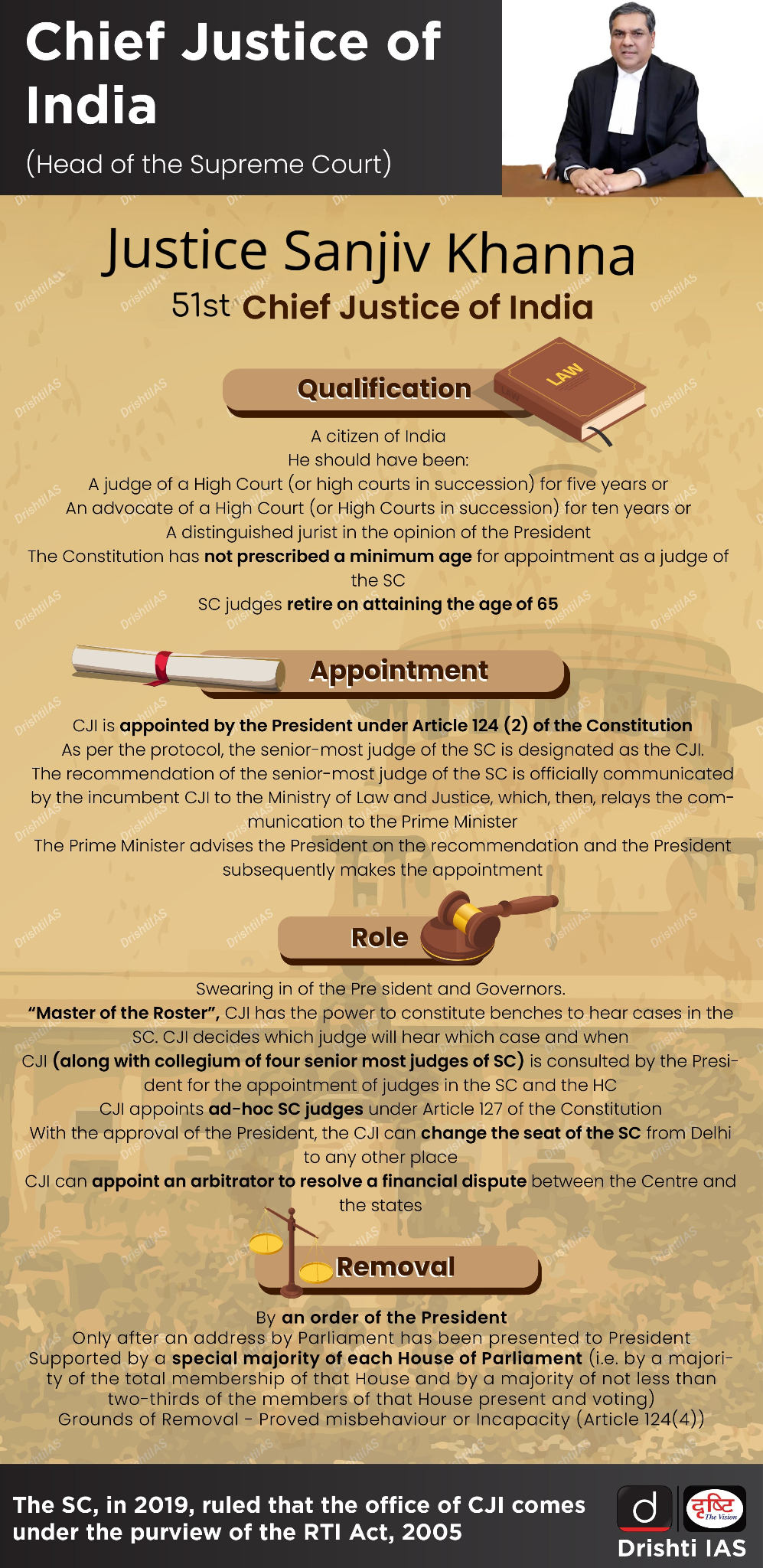Important Facts For Prelims
Appointment of Chief Justice of India
- 12 Nov 2024
- 6 min read
Why in News?
Recently, the President of India administered the oath of office to Justice Sanjiv Khanna as the Chief Justice of India (CJI).
- He succeeded Justice D.Y. Chandrachud, becoming the 51st CJI.
Justice Sanjiv Khanna Key Judicial Rulings
- He was part of several Constitution Bench rulings, including the one upholding the abrogation of Article 370 of the Constitution and striking down the 2018 electoral bonds scheme, among others.
- He was also part of the recent majority ruling in the Aligarh Muslim University (AMU) minority status determination case.
- He supported the use of Electronic Voting Machines (EVMs) in elections, rejecting calls to revert to paper ballots.
What are Key Provisions Related to CJI?
- Appointment: A Supreme Court judge is appointed by the President under Article 124 (2) of the Constitution. As per the convention, the senior-most judge of the Supreme Court is designated as the CJI.
- The seniority is measured by the length of service on the Supreme Court.
- Qualification: A person to be appointed as a Supreme Court judge, should have the following qualifications:
- He should be a citizen of India.
- He should have been a judge of a High Court (or high courts in succession) for five years; or
- He should have been an advocate of a High Court (or High Courts in succession) for ten years; or
- He should be a distinguished jurist in the opinion of the president.
- Role of CJI: As the "Master of the Roster," the CJI holds the authority to assign specific cases to particular benches and determine the schedule for their hearings in the Supreme Court.
- CJI (along with collegium of four senior most judges of SC) is consulted by the President for the appointment of judges in the SC and the High Court.
- CJI appoints ad-hoc SC judges under Article 127 of the Constitution.
- With the approval of the President, the CJI can change the seat of the SC from Delhi to any other place.
- Removal: The CJI can be removed by the President only after Parliament presents an address, supported by a special majority in both Houses (a majority of total members and at least two-thirds of those present and voting).
Appointment of CJI in Other Democratic Countries
- United States: The Chief Justice has a life tenure i.e., Chief Justice can serve until he/she is impeached.
- United Kingdom: The Judicial Appointments Commission appoints the Lord Chief Justice through a special panel from the Appeal Court Judges or from the Supreme Court.
- The tenure for the Lord Chief Justice is life, with a mandatory retirement age of 75.
UPSC Civil Services Examination, Previous Year Question (PYQ)
Prelims
Q. With reference to the Indian judiciary, consider the following statements: (2021)
- Any retired judge of the Supreme Court of India can be called back to sit and act as a Supreme Court judge by the Chief Justice of India with the prior permission of the President of India.
- A High Court in India has the power to review its own judgement as the Supreme Court does
Which of the statements given above is/are correct?
(a) 1 only
(b) 2 only
(c) Both 1 and 2
(d) Neither I nor 2
Ans: (c)
Q. With reference to National Legal Services Authority, consider the following statements: (2013)
- Its objective is to provide free and competent legal services to the weaker sections of the society on the basis of equal opportunity.
- It issues guidelines for the State Legal Services Authorities to implement the legal programmes and schemes throughout the country.
Which of the statements given above is/are correct?
(a) 1 only
(b) 2 only
(c) Both 1 and 2
(d) Neither 1 nor 2
Ans: (c)
Q. What is the provision to safeguard the autonomy of the Supreme Court of India? (2012)
- While appointing the Supreme Court Judges, the President of India has to consult the Chief Justice of India.
- The Supreme Court Judges can be removed by the Chief Justice of India only.
- The salaries of the Judges are charged on the Consolidated Fund of India to which the legislature does not have to vote.
- All appointment of officers and staffs of the Supreme Court of India are made by the Government only after consulting the Chief Justice of India.
Which of the statements given above is/are correct?
(a) 1 and 3 only
(b) 3 and 4 only
(c) 4 only
(d) 1, 2, 3 and 4
Ans: (a)





